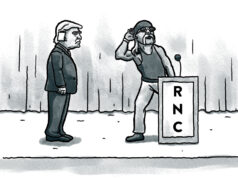
AUSTIN — In the first phase of President Donald Trump’s America, Austin’s centerpiece mega-media festival, South by Southwest (SXSW), took it upon itself to showcase the political, nurture dissent, and beam for the arts — the kind of confluence of energies that can only happen in a slightly unreal place (and for only one week at a time).
It seemed important for me, as a freelance journalist, to attend politically motivated events, but, halfway through my South By (as we say), I asked myself why that was.
There were a lot of great feature films on night two, but I chose instead to see Brian Knappenberger’s documentary about Hulk Hogan suing Gawker. A skillful documentarian, Knappenberger sees politics simply as the free press reasonably trying to critique people in power. Nobody Speak: Hulk Hogan, Gawker, and Trials of a Free Press takes a critical look at a case that was ridiculous in its details. The film winds up making the decent-minded person iffy about both sides.
Sex, lies and millions of dollars
The documentary centers on Gawker’s publishing of a sex tape in which Hulk Hogan was pursuing illicit acts on camera with the wife of his good friend, Bubba the Love Sponge. Hogan sued Gawker, whom the late New York Times culture columnist David Carr once described as the “mean girls” of the press, for damages.
If the main gist of the case already unsettles you, then its revelations will also inspire audible cringes, as it did to an opening-night audience at the Alamo Drafthouse.
In a Florida courtroom, Gawker’s brilliantly bitchy mastermind, Nick Denton, became the embodiment of liberal smugness and perversion. Hogan, somehow, became a victim. The no-eyebrow attorney representing Hogan went further to punish the actual reporter who shared the sex tape.
Was Hogan’s case warranted, since he is such a public figure?
The prosecution claimed that the privacy of Terry Bollea (Hulk Hogan’s real name) was invaded, not Mr. Hogan’s. The documentary points out that, historically, the persona of Hogan was a larger-than-life character, always designed to be the All-American guy to project All-American dreams (which includes … oh yes).
As Knappenberger lays out the facts, the viewer will be unsurprised to learn that the jury punished Gawker. What was surprising, however, were the numbers: $140 million against the media company, $10 million against the individual writer).
Film uncovers two-pronged attack on media
Knappenberger was editing his film during the election. On that fated night of Nov. 8, 2016, he quickly realized that he was making a movie about a movement, political and otherwise, that was turning fiercely against the media.
So, Knappenberger started recutting immediately to include the germane connections.
Further, what concerned the makers of Nobody Speak is that a billionaire, self-styled Ayn Rand pulp hero/PayPal inventor, Peter Thiel, discreetly took care of Hogan’s legal fees (backstory here).
But the illuminating connection the doc’ makes is in Las Vegas, where the act of billionaires taking on already crippled newspapers (suffering themselves from dwindling readership and their best source of revenue, classifieds) becomes a disturbing trend. This trend begins with the buyout of the Las Vegas Journal Review.
One thing that’s important to know is that the job of journalism is inherently fraught with conflict. Journalists are supposed to stand outside, and the good ones don’t expect to be liked. In this sense, the Gawker crew are a species of journalist. The more scrupulous journalists of the Las Vegas Review Journal faced a dilemma, the doc’ shows, when billionaire casino mogul Sheldon Adelson organized a crew of shadow investors, headed by his son-in-law, to purchase the paper for $140 million, a number incongruous with its value.
Three journalists began investigating the secret of who bought them. For the following year, the newspaper was tasked with odd assignments and edits, and its top editor accepted a buyout offer, citing concerns about the new ownership.
A two-pronged attack on the news becomes clear in hindsight: Trump from the bully pulpit, and CEOs from the mythic, conveniently voiceless shareholders.
Journalism will only get harder
A sense of outrage and helplessness could follow a viewing of Nobody Speak. I was struck by the equally intense animosity directed at the citizen function by the rich and the vox populi —somehow the same pool, politically.
A Silicon Valley journalist from Buzzfeed featured in the documentary was in attendance. He told the audience that, despite the struggle to regain legitimacy, despite the bleak economic conditions of the industry, it was a good time to be a journalist. One could agree the field has grown more interesting.
It is a hard job to try and get people a good, true story. Nobody Speak confirms that it is going to get harder. Public opinion is against the job. And the very rarified group of men Mr. Thiel represents, the ones with the real resources, are against it as well.




















